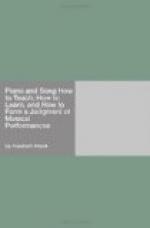And now I will speak of the violin and the flute. I have never availed myself of those expedients; it is a method which I have never learned. I will describe for your amusement a few interesting incidents, which I had an opportunity to witness in a not inconsiderable city, while on a journey with my daughters. The teacher with the flute was a gentle, quiet, mild musician; he was on very good terms with his pupil, and indulged in no disputes; every thing went on peaceably, without passion, and “in time.” They both twittered tenderly and amicably, and were playing, in celebration of the birthday of an old aunt who was rather hard of hearing, a sonata by Kuhlau, which was quite within the power of both. The old aunt, who, of course, could hear but little of the soft, flute tones, and the light, thin, modest, square piano, kept asking me: “Is not that exquisite? what do you think of it?” I nodded my head and praised it, for the music was modest and made no pretension.
I will pass next to the violin. The possessor of this was a type of presumption, vulgarity, and coarseness, and understood how to make an impression on his pupils and their parents by the assumption of extraordinary ability. He consequently enjoyed a certain consideration. He was, moreover, a good musician, and played the violin tolerably in accompanying the piano, in Beethoven’s opus 17 and 24. In this portrait you have a specimen of the violinist as a piano teacher. Of course he understood nothing of piano-playing, and took no interest in Wieck’s rubbish about beauty of tone; he cared only for Beethoven. He now and then tried to sprawl out a few examples of fingering, in a spider-like fashion; but they were seldom successful. His pupils also possessed the peculiar advantage of playing “in time,” when they did not stick fast in the difficult places. At such times he always became very cross and severe, and talked about “precision;” in that way instilling respect. His pupils did not jingle, but they had a peculiarly short, pounding touch; and floundered about among the keys with a sort of boldness, and with resolute, jerking elbows. They certainly had no tone, but the violin was therefore heard the better; and after each performance we might have heard, “Am I not the first teacher in Europe?”
MRS. SOLID. You certainly have shown up two ridiculous figures.
DOMINIE. True; but I leave it to every one to make themselves ridiculous.
MRS. SOLID. I am very glad that you have furnished me here with the criticisms of which I stand in need; for I might otherwise have been in danger of supplying you with an example at the next soiree, perhaps at the banker’s, Mr. Gold’s. But, as I should like to hear your answer, I will listen to, and report to you, what is said in a certain though not very numerous clique, who are opposed to you and your labors.
DOMINIE. Those people would act more wisely, if they were to study my writings; in which I will make any corrections, if there is any thing that I can add to them, for the advantage of truth, right, and beauty.




